Monthly Archives: April 2019
29th April 1919 Tuesday
The Thaw Gathers Pace
All material produced or reproduced here and throughout this work is the sole copyright of the author and the family of Doctor D.C.M. Page MC
“On Tuesday, April 29th, the ice on the river began to break up. It was a wonderful sight to see the ugly, brown, swirling waters rushing down towards the White Sea carrying huge blocks of ice and masses of debris – trees, houses, and even barges. The crunching noise made by the ice was terrific. Crowds lined the river bank watching the awful spectacle. Some Russian men salved the logs as they were borne downstream on blocks of ice. These men armed with ice hooks jumped from block to block, and tied ropes to their captures. It was an exciting game to watch. By evening most of the ice had disappeared downstream, but the river was still bringing down a lot of ice. The speed with which the river broke up, and the ice disappeared seaward, was due to the fact that ice-breakers had kept the main channel open all winter, and thus prevented blocking at the bad bends and narrower parts of the river. During the afternoon the hospital ship ‘Khalyan’ passed downstream escorted by a large ice-breaker.”
The dynamiting of the Dwina, reinforced by the operations of the ice-breakers that had taken place during the month of April had helped to keep parts of the river open to some traffic. The railway that had been laid on the ice had been dismantled and it had been hoped to allow relief troops to reach Archangel. An ice-breaker was being used as a ferry to cross the river and some movement of ships that had been unable to reach the port began.
Ironside at this time reaffirms the modus operandi for the British forces out in Russia was simply an orderly withdrawal. A simple enough intention you might think but it would prove anything but.
- Further to yesterday’s submission it should be noted that Monitor M23 also arrived at Archangel on the 5th May. An M15 class vessel M23 would be similar to M25 and M27. She saw out the rest of the conflict before arriving back in the UK in November that year. She was scrapped in Fife during 1959.
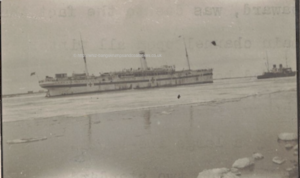
HMHS Kalyan on the River Dwina preceded by an Ice-breaker.
(Picture from the diary all rights reserved)
Find out about our connection with Dr Page and an introduction to his diary here
28th April 1919 Monday
A Honky-Tonk at the Free and Easy
All material produced or reproduced here and throughout this work is the sole copyright of the author and the family of Doctor D.C.M. Page MC
“On April 28thwe had a ‘Free and Easy’ entertainment for the staff and convalescent patients in our recreation room. Each man got two bottles of beer or stout, four packets of cigarettes, or a tin of tobacco, chocolate, toffee, cakes, biscuits, and coffee for the teetotallers. A very good musical programme was gone through, although the piano, borrowed from one of the monitors, was not very good. It was a huge success, and uplifted the men’s spirits wonderfully.”
The men were treated to a party known as a “free and easy” to lift the spirits. Part of the celebrations involved an old piano borrowed from one of the monitors stationed off Archangel. Monitors were small ships of around 540 tons whose sole purpose was to carry a large gun serving as an offshore artillery battery. Of the five that were sent out to Russia two were deployed to Archangel at this time and they were of the M15 class HMS M25 and HMS M27, so it was one of these that provided the piano for the “free and easy”. These ships had a complement of 69 men plus officers and being quite small in size would have seemed quite well populated.
M25 and M27 survived the expedition to Russia until the end of operations in September 1919 when they were both scuttled in the Dwina river after being grounded by the receding water level. They had a few skirmishes with the enemy including becoming almost grounded in the shallow summer waters of the Dwina. They were joined in the summer by M33 a slightly bigger class that had seen action at Gallipoli. M33 survived not only WW1 and Russia, but has survived to this day, despite being hit twice by enemy gunfire, the shells piercing the hull and an internal bulkhead before rattling around the interior without exploding. For those that are interested she is preserved now in dry dock at the Museum of The Royal Navy in Portsmouth.
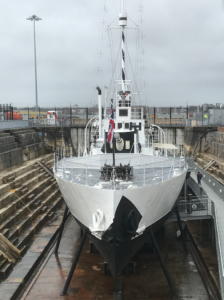
Monitor HMS M33 preserved at Portsmouth
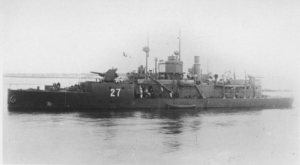
M27 Pictured on the Dwina 1919 (Public domain)
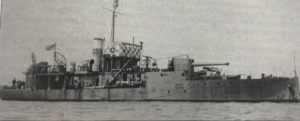
M25 as pictured in Damien Wright’s excellent book “Churchill’s Secret War with Lenin” (public domain)
Find out about our connection with Dr Page and an introduction to his diary here
24th April 1919
Bugs Kept at Bay
All material produced or reproduced here and throughout this work is the sole copyright of the author and the family of Doctor D.C.M. Page MC
“On April 24th I moved into a new billet. I got a room in a very pleasant, clean house close to our hospital. The owners of the house were a young married couple, the husband being a motor engineer (marine). I took the precaution to make my bed bug-proof – I pulled it out from the wall, and immersed the legs in tins full of water. I was very comfortable in this billet, and my landlady was very kind. She gave me a cup of tea every morning before I went out, and often at night invited me to drink tea in their room. Of course, I had all my meals at the mess round the corner.”
Find out about our connection with Dr Page and an introduction to his diary here
19th April 1919 Saturday
Standing Room only and Rascally Priests
All material produced or reproduced here and throughout this work is the sole copyright of the author and the family of Doctor D.C.M. Page MC
“On Saturday, April 19th, the cars stopped running on the frozen river between our island of Solombola and Archangel, as the ice is expected to break up any day now. A wooden track was laid across the river for the use of pedestrians. At 11.30 p.m. Lt. Herman, Capt. Steuart and I went along to the Russian Church in Solombola to attend the midnight service. The church was absolutely packed full of people, but we managed to squeeze in somehow or other. There are no chairs, or seats of any description in Russian churches, and the whole floor space of this large church was crowded with all sorts of Russians, male and female, old and young. The crowds outside kept shoving and pushing in all during the service, and my toes and back suffered severely. It was more like a free fight, or one of Patrick Thomson’s cheap sales, than a church service. Everybody was buying candles at a stall just inside the main door. They lit them, and put one in front of one or other of the many ikons dotted about the church interior. Each worshipper also held a lighted candle or two in his or her hand, so that the heat inside the building soon become well-nigh unendurable. The smell of burning candles was sickening too, and my coat was soon festooned with candle grease! At midnight the altar doors opened, and a procession of rascally-looking priests entered. They marched, or rather elbowed their way through the mob in the body of the church, to the main entrance, where they left the church, and walked round the building outside with lighted candles. As they passed through the church they chanted a dismal ditty, and everybody tried to light their candles from those of the priests. It was a rare old scramble, and I was tossed about like a cork on a stormy sea. On the return of the priests all the electric lights were switched on, and the heat got worse. A mixed choir sang some lovely music whilst the priests visited the ikons. When we left at 1 a.m. the crowds were still in the church burning candles, moaning and crossing themselves. The church bells rang all night. It is an Eastertime custom in Russia to greet one’s friends with ‘Krasni Kress’ (Christ is Risen), and then embrace and kiss. When we left the church the streets were crowded with people (there was a special extension of the curfew order), and Steuart tried this on with one of his Barishna friends. He got his face soundly slapped for his trouble!
It snowed very heavily all that night, and lay about a foot deep next day.”
Find out about our connection with Dr Page and an introduction to his diary here
12th April 1919 Saturday
The Thaw Begins but No Let Up for the 85th General
All material produced or reproduced here and throughout this work is the sole copyright of the author and the family of Doctor D.C.M. Page MC
“On Saturday, April 12th, it rained for the first time this year. It was very dull and mild all day, and the snow disappeared rapidly all day. One had to wade through about a foot of water in the streets. Two days after this we were able to bask in the sun after lunch. There appears to be no spring out here, but a rapid change from hard frost, and biting winds, to sunny skies, and warm days. Of course the ground was still white – a dirty white now – with snow, and the river still blocked up with ice.
Things got busier than ever in our hospital. Convoys of wounded and sick arrived almost every day. The operating theatre was very busy, and we were often at work in there till late on at night.”
Find out about our connection with Dr Page and an introduction to his diaries here
9th April 1919 Wednesday
A Crash Course and Be Nice to The Russians!
All material produced or reproduced here and throughout this work is the sole copyright of the author and the family of Doctor D.C.M. Page MC
“On Wednesday, April 9th, there was a meeting of the Allied Medical Society, in our hospital which was a great success. Col. Richmond, our O.C. read a paper on ‘Aeroplane Crashes’, which was very well received. The guests afterwards inspected the hospital, and took tea with us. At night I attended a mass meeting of British officers in Archangel, when the Base Commandant – Col. Crosbie – lectured us on our attitude to the Russians. He was very good, but, of course, his remarks did not apply to the majority of us, but only to a very few, who had evidently been drinking heavily o’ nights, and then denouncing the Russians as lazy, dirty swine etc., remarks, doubtless true when applied to the Russians we meet in Archangel, but perhaps best left unsaid.”
Col. James Dayrolles Crosbie had been Commanding Officer of the 16thBattalion Queen’s Royal West Surrey Regiment until the Armistice on the 11thNovember 1918. He was then sent out to Archangel to take over as Base Commandant, where his work would entail relieving Brigadier-General Henry Needham, the Administrative Staff Officer, of a lot of his work.
The son of local nobility he was born in Co. Kerry, Ireland in 1865. As a young man he was destined for high office, by 1894 he had been appointed to the post of High Sheriff of County Kerry. Educated at Harrow, he chose a career in the military and in 1885 received his first commission in the 2nd battalion Royal Welch Fusiliers studying at the Royal Military College, Sandhurst. He relinquished his military career in 1893 and married Maria Caroline Leith the daughter of Major James Leith V.C. in 1894.
He sold his castle home in Kerry in 1912 but the outbreak of war in 1914 saw Crosbie resume his military career commanding the 11th Battalion Lancashire Fusiliers then 16th Battalion QRWS reaching the rank of T. Brigadier-General. Also, in 1919 he was made Companion, Order of St. Michael and St. George (C.M.G). He was Deputy Lieutenant County Kerry and Justice of the Peace.
He had settled in Scotland at Muircambus House, Kilconquhar, East Fife, which by some coincidence was about six miles from where Captain Douglas Page had established his general practice in Pittenween, Fife, long after his military service had ended. It is entirely possible, as Dr Page’s practice covered a wide area that Crosbie was a patient of his.
Known as “The General” Crosbie had then become Chairman of Fife County Council between 1938 and 1945 so he would have been well known to Dr. Page throughout the rest of his life. He finally passed away in December 1947 aged 83.
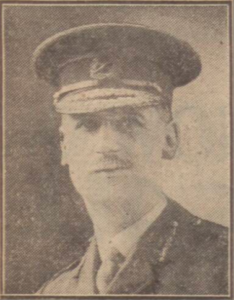
Brig-General Crosbie. Dundee Courier, 2nd November 1932 © D.C.Thomson & Co. Ltd. Image created courtesy of THE BRITISH LIBRARY BOARD. https://www.britishnewspaperarchive.co.uk/
Find out about our connection with Dr Page and an introduction to his diaries here